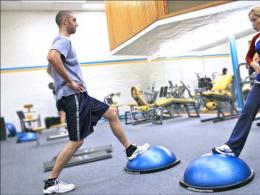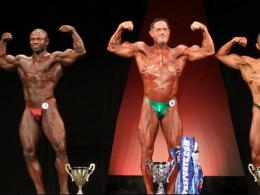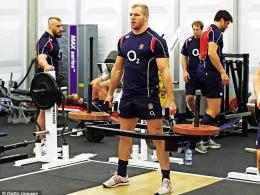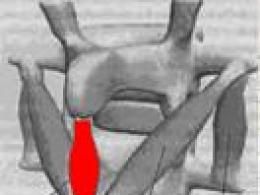What is the nationality of Martin Fourcade? Open-hearth furnace. How much does the best biathlete in the world Martin Fourcade earn?

Martin Fourcade rarely talks about his loved ones. About wife, children, family. “We’ve already seen enough,” he likes to say. But it's impossible to talk about his career without touching on his relationship with one of his two brothers, Simon. The first two chapters of his autobiography are called "Brotherhood" and "In the footsteps of my idol." And this is no coincidence.
Simon holds an important place in Martin's career. And vice versa. This is for the better, but also for the worse. Their relationship is strong, complex, mixing love, admiration, but also rivalry, jealousy and conflict. Their common history is the history of the ambitions of one, which were born and extinguished the ambitions of the other.

In the Fourcade family for a long time there was a rule: the champion is Simon. “My brother was my idol,” writes Marten, “I didn’t even dare to dream of ever being equal to him.” Everything indicated that Simon would go far. “From my youth, I had the status of a leader. I was considered the rising star of the French biathlon, and I felt great in this role. I didn’t doubt myself, I was calm and confident.”

Now, at almost 34 years old, Simon is coming to the end of his sports career. The career that was left behind is honorable enough. World Championship silver and a small crystal globe in the standings of individual races in 2012, fifth place in the total at the same time ... Many would dream of such results. If only they weren't inspired by more. “I never had the desire to become another good biathlete,” says the older brother, “I wanted to go down in the history of my sport. My results in juniors gave me such hope. I had everything to achieve this.”
But now Marten writes the history of biathlon, not Simon. The coup happened in Vencouver in 2010. When they arrived in Canada, Simon was first in the general classification of the World Cup. He was 25 years old, and it seemed that these Games belonged to him. “I arrived as the owner of the yellow jersey, in the status of the leader of the French team. And I totally failed,” he sighs. Marten, on the other hand, survived the rise, winning silver in the mass start, the last individual race of the Olympics. After the finish, he squeezed in the arms of his brother. “This medal was supposed to be yours,” he whispers to Simon. Simon is in tears. Their fate is set.
 Vancouver 2010, between happiness and pain. Marten, who won a medal in the mass start, comforts his brother, who failed the Olympics
Vancouver 2010, between happiness and pain. Marten, who won a medal in the mass start, comforts his brother, who failed the Olympics The ascent to Calvary of Simon Fourcade began, which had to survive a double blow - in the face and in the heart. He not only did not become the king of the world biathlon, but his own younger brother was going to capture such a coveted place for him. In his steady rise, Marten crushes everything, including Simon's hopes. “When your dream is shattered because of a brother, moreover, a younger brother, it’s hard to accept,” Simon admits.
The severity of what is happening is aggravated by the taste of injustice. At least he thinks it's unfair. Because Simon worked like hell. A slave to training, he deserved to be at the top more than anyone else. “Marten ruined all my schemes,” he explains, “I thought that if I worked the hardest, I would be the best. But in sports, and not only in sports, talent also plays an important role. You must be lucky with talent. Martin is a hard worker. But he's also a very big talent." “Sometimes the truth hurts, but yes, Martin had more potential than his brother,” says Thierry Dusser, their youth coach who worked with both brothers.
Since the spring of 2010, relations between the Fourcade brothers have become increasingly strained. Simon is not yet ready to say goodbye to his dreams of becoming the best. "I realized that my brother was going to surpass me, but I couldn't accept it," he says. “Yeah, it was definitely jealousy.” He is drawn into a meaningless, absurd competition, which, however, he cannot avoid: “For a year and a half or two years, I compared myself only with him. Marten has become my obsession. The rest no longer existed. If I beat Marten, I was happy. When I finished seventh, if he was behind, it was a blessing."
Simon also remembers the "icy" Christmas Eve when the two brothers acted like two bulldogs to each other. “We didn’t punch each other in the face, but there was a very tense moment. Our mother didn't like it. She is very respectful of family values. It was hard for her to see the enmity of her children because of their common passion. In 2011, the father made an attempt to reason with the elder. Useless. “I didn't want to listen to him because I was stubborn as a donkey,” says Simon, “The topic was very painful and I was not ready to discuss it.”
Marten also had a hard time in this situation. Louis Habert, a close friend of the Fourcade brothers, says that Martin tried to cause as little pain as possible: “Simon is very affectionate, but it is sometimes difficult with him. Marten has learned to withdraw from time to time. It was hard for him to see his brother in tears, but this could not reverse his desire to build his own career. It's okay, he should have thought of himself." "Simon's misfortune could have sunk us both," Marten explains in his book. "You can't do anything for Simon," coach Stéphane Boutier admonished him.
It took about two years for Simon Fourcade to adjust to the new situation. When he succeeded, he had the best season of his career, finishing 5th in the World Cup total and winning silver at the World Championships in Ruhpolding. It was there, in February 2012, that the broken fraternal bond began to be restored.
The first race in Ruhpolding, the mixed relay, was a nightmare for Simon. “Marie passed the baton to me first, and I completely failed,” he says. “I was crushed, I lived through it for two days.” But after 48 hours, the ice began to crack. “Before the sprint, I was in a depressed mood. Marten came to me to cheer me up. It took him half a minute to tell me, “Come on, Simon, relax. The relay is in the past, forget it. We hardly spoke to him then. And I said to myself: "stop thinking that he is against you."
 World Cup in Ruhpolding - the moment of reconciliation of the brothers
World Cup in Ruhpolding - the moment of reconciliation of the brothers In the next competition, Simon earns his only podium at the world championships, in the individual race. On that day, Marten had an unsuccessful shooting, in contrast to his older brother, who shot 19 out of 20. Therefore, shortly before the finish line, accidentally being nearby on the track, the younger decided to help the older one. Simon recalls: “He caught up with me, and when he was overtaking, he told me: “hold on to me, I will give you a ride.” But then he still ran faster than me, so I didn’t hang on to him for very long. But this symbolic gesture contributed to the fact that relations between the brothers began to warm up again.
The start of 2012 was great for Marten, who won three world titles and his first Big Crystal Globe. But for the first time since Vancouver, Simon didn't feel bitter. “With my medal, I felt that not everything in the world exists only for Marten.”
After the storm, the time of intimacy has returned. Simon resigned himself to the fact that for the public he becomes "Marten's brother", contrary to what was accepted in their childhood. He calmed down when he realized that his brother was not better than him, but "the best in the world." Because he remains the youngest, Marten will never be Simon's idol, as Simon was for Marten 15 years ago. But in his attitude towards his brother, respect and admiration replaced envy. “It's amazing what Marten is doing now - 18 podiums in a row! In my entire career, I have only had 9…”
Brothers in 2010:
Brothers in 2011:
Famous French biathlete Martin Fourcade was born in the French district of Sere, in the Eastern Pyrenees. This event happened in 1988, on September 14th.
At the 2010 Olympic Games in Vancouver, Martin Fourcade won a silver medal in the biathlon mass start. At the 2011 Biathlon World Championships, which was held last March in the Russian city of Khanty-Mansiysk, Martin Fourcade won a full set of World Championship medals. He is the younger brother of a biathlete.
Martin Fourcade began his biathlon lessons at the age of fourteen. Martin Fourcade got into the national biathlon team back in 2006, but he really began to play for the team only in 2008 at the World Cup in the city of Holmenkollen.
In 2007 and 2008 Martin Fourcade took part in the junior world championships, and in 2007 he took third place in the relay race.
In March 2008, in the Norwegian capital, Oslo, Martin Fourcade took 61st place in the Biathlon World Cup.
The next sports season for Marten was more successful. At the World Cup in Hochfilzin, Martin Fourcade took 36th place in the individual race and 10th place in the sprint race. Martin Fourcade finished the 2009 sports season with the 24th number in the overall standings of the World Cup, and in every race of this season he consistently got into the top twenty.
In the 2009-2010 sports season, Martin Fourcade began to show better results than before. He finished every race no lower than 10th place. Martin Fourcade was included in the French national biathlon team at the 2010 Olympic Games in Canada, where he was able to win silver in the mass start.
In the Finnish city of Kontilahti, Martin Fourcade took first place in the pursuit. And in Oslo, Norway, he won the pursuit race and the sprint race.
Thanks to two victories in the pursuit Martin Fourcade won the 2009-2010 sports season in the pursuit program in the Biathlon World Cup. He beat Austrian biathlete Simon Eder by a point. In the overall standings, Martin Fourcade took 5th place, and his brother Simon was seventh.
The 2010-2011 sports season for Martin Fourcade went well. At biathlon competitions in the city of Östersund, he was three times in the top five athletes, of which he took third place twice. In the city of Ruhpolding, Martin Fourcade won silver medals in each of the three races, and in Fort Kent and Antholz, Martin Fourcade won the mass start. At the Biathlon World Championships in Khanty-Mansiysk, Martin Fourcade arrived as one of the obvious contenders for a medal.
In the mixed relay, Martin Fourcade took third place, showing excellent shooting quality and good speed on the track. In the sprint race, Martin Fourcade won silver, although he missed twice - speed compensated for mistakes in shooting at the turn. A day later, Martin Fourcade became the first in the pursuit race, although he “missed” three times.
In the overall standings of the World Biathlon World Cup this season, Martin Fourcade became the third and ran from Antholz to Oslo in the red jersey of the dealer in the mass start.
In the 2011-2012 sports season, Martin Fourcade set himself the task of second or even first place in the overall standings of the Biathlon World Cup.
In the Swedish city of Östersund, Martin Fourcade took first place in the pursuit and in the individual race. This allowed Marten to put on the yellow jersey of the world biathlon leader.
Name:
Martin Fourcade
Zodiac sign:
Virgo
Place of Birth:
Seret, France
Activity:
biathlete
The weight:
75 kg
Growth:
185 cm
Biography of Martin Fourcade
Martin Fourcade is a famous French biathlete who managed to win many glorious victories during his career. In recent years, our today's hero is perhaps the main hope of the French team. That is why in our article we decided to tell a little more about his life and sports career. Indeed, at the Olympics in Sochi, Martin Fourcade will definitely show himself in all its glory.The early years, childhood and the family of biathlete Martin Fourcade
The future famous athlete was born in the city of Sere on September 14, 1988. From an early age, Marten was engaged in various "winter" sports under the strict guidance of his father, a professional coach. First, our today's hero tried his hand at snowboarding, then hockey. However, in the end, like his older brother Simon, he chose biathlon.
Martin Fourcade - biathlete of the highest class
It is noteworthy that Marten never hid the fact that the sports careers of other members of his family had a great influence on his sports career. At the time when Fourcade Jr. took his first steps in the world of professional sports, his brother Simon was already storming the podiums of major international competitions with might and main. For a long time, Marten was his number one fan. But, in the end, he decided to seriously engage in biathlon himself.
The first successes came to the athlete very soon. After a series of successful performances at youth and junior competitions, Martin Fourcade made his way into the French national team, in the ranks of which he began to play since 2002. At that moment, the young athlete was only fourteen years old.
Christoph Sumann and Martin Fourcade sing at the award ceremony
Martin Fourcade grew and improved, and therefore, four years later, he managed to successfully make his debut at international youth competitions. At first, the results of the athlete were not the highest. In 2007, our today's hero managed to win bronze in the relay race, but subsequently Marten invariably found himself outside the coveted pedestal. As a rule, he completed his performance among the 10 strongest. But this ambitious athlete was not enough.
Biathlete Martin Fourcade in big sport
For the first time, Martin Fourcade appeared in the "adult" competitions in 2008 at the World Cup in Oslo, Norway. At that time, our today's hero finished the race only ... sixty-first. However, this offensive "click on the nose" seemed to only benefit the talented young athlete.The very next season, Marten improved quite well and eventually managed to win the first ranking points in the German Hochfilzen, finishing thirty-sixth in the individual race and reaching the top ten in the sprint. After that, the young Frenchman also performed brilliantly at the World Championships, in which he consistently ranked among the twenty strongest athletes in each race.
Facial expression of Martin Fourcade
Thanks to this, in the overall standings of the 2009 season, Martin Fourcade managed to take the final 24th place, which was an undoubted success for the young guy.
The next year was even more successful. The talented Frenchman took another step up, and therefore soon managed to win his first medals. As part of the Vancouver 2010 Olympics, Fourcade got to the second final place in the mass start (15 km). The silver medal was a real surprise for all fans of the biathlete, but later our today's hero successfully proved that all this was by no means a simple coincidence.
At the World Championships in Kontiolahti, Finland, the talented Frenchman won a gold medal in the pursuit, and then managed to win two victories in Oslo, Norway (in the pursuit and sprint). As a result of all this, in the 2009/2010 season, the athlete became the fifth in the overall standings of the World Cup. He began to be called one of the most promising biathletes on the planet. Martin Fourcade began to be offered lucrative advertising contracts, and also often invited to French television. As a result, already at the age of twenty-one, a talented athlete became the main hope of the French team.
In the 2010/2011 season, the biathlete won several more bright victories. Among these, the most impressive achievement was the full set of awards (gold, silver and bronze) at the World Championships in Russian Khanty-Mansiysk. These, as well as some other achievements, allowed Martin Fourcade for the first time in his career to enter the top three biathletes in the overall World Cup standings. At that moment, it became clear to everyone that the talented Frenchman came to the world of biathlon in earnest and for a long time. And a year later, Marten successfully proved the truth of these words.

Personal life: there are rumors that biathlete Martin Fourcade is homosexual
At the next World Championships in Ruhpolding, Germany, Martin Fourcade won three sets of gold medals. As a result, in that season, our today's hero managed for the first time in his career to lead the overall World Cup standings. Having removed the Norwegian Ole Einar Bjorndalen from the throne, the Frenchman has firmly established himself as the main favorite of any race. Subsequently, Martin Fourcade repeatedly proved that he is one of the best biathletes of his generation.
Martin Fourcade at present
In the 2012/2013 season, our today's hero managed to improve his own record and, with a fantastic 1248 points, became the best shooting skier in the world for the second time in a row. In the status of the main hope of the French team, as well as one of the brightest stars of the entire championship, Martin Fourcade also approaches the Winter Olympics in Sochi. At the time of this writing, the result of the Frenchman in these prestigious competitions was not yet known. However, hardly anyone seriously doubts that Martin Fourcade will be able to bring a couple of prestigious medals from the Sochi games.Personal life of Martin Fourcade
For several years now, Martin has been dating a 27-year-old French woman named Ellen. She, like Fourcade himself, goes in for skiing. The relationship of the two lovers is moving smoothly towards the wedding. The only obstacle, according to some French journalists, is Ellen's jealousy for Martin's longtime friend Emil Svendsen, with whom the biathlete often spends time together. Clinging to this fact, the French media hastened to call Marten a homosexual. However, the athlete himself denies these rumors.He doesn't gamble, doesn't invest, doesn't waste money, and doesn't consider himself a miser. He indulges in pleasure, drives a sponsored BMW and prides himself on doing his job so well that he gets paid well for it. He is used to giving 120 percent to win, but is not ready to sacrifice time with his family even for a very lucrative advertising contract - he knows that tomorrow he will be offered an even more profitable one. After all, he is Martin Fourcade - the most successful biathlete of the 21st century.
In November 2017, Martin's autobiography My Dream of Gold and Snow was published in France. It is planned to be published in Russian next year. Forbes read the book in the original and found in it interesting details about how the star biathlete learned to make money on his victories.
The French are usually accused of pettiness, and in response they rush to prove with fervor - they are not petty, they just want everything to be properly organized, honestly and not to the detriment. It seems that Marten was guided by these considerations. At the very beginning of his sports career, long before the first Olympic medal, he created the Martin Fourcade company to manage all non-sporting affairs: relations with the media (after all, if he starts to win, he will have to actively interact with them), sponsors (and they will definitely appear after the first success) and prize money (he was convinced there would be many). And this foresight of the athlete was very helpful. When his achievements really aroused the interest of brands, Marten already had a scheme for working with them. Subsequently, changes were made to the company's charter, which made it possible to separate two financial flows - prize money for sports results and sponsorship contracts. "Since then I have been able to hire people and pay them salaries from my personally earned prize money", - Marten explains the decision to make his bookkeeping more transparent so that sponsors do not feel that their money is being spent on something, in their opinion, not related to the contract.
However, sponsorship money (and Fourcade repeatedly emphasized this) is not the main topic for discussion when concluding an agreement. For an athlete, it is not so much the amount prescribed in it that is important, but the form of cooperation. And, of course, the impact on the image that this collaboration can have. “I am a supporter of the philosophy - less is more (at the same time, Marten has more than 10 partners, including 5-6 outfit partners. - Forbes). I can hardly imagine myself advertising what I don’t like, even for very good money. Exactly therefore, I never wanted to have an agent who is looking for sponsors, taking a percentage of each contract.In the pursuit of money, such agents can embarrass the athlete, forcing, for example, to sign a contract with a company whose reputation is not perfect, or with one that preaches ideas that are not close to you."
Instead of an agent, Fourcade has had a lawyer for many years, whose job is to evaluate a potential deal, discuss all the points of a future contract and draft it. "From the moment the contract is signed, the relationship with the sponsor is only my job". And this work can be no less exciting than any other race from a general start. "We do a commercial with someone, someone just uses my image, explains Marten in the book. - But, for example, we have been discussing this option with Rossingol for a long time: I suggested that they place the entire collection of my trophies in their hall. I have no desire to create a museum of personal glory at home, but at the same time it seems wrong to me to keep Olympic medals - and each of them is a work of art in itself, by the way - in some box in the back of the garage ... Sometimes a sponsorship agreement involves speaking to management or employees of the company. And by the way, I really like this idea. I think people are really interested in listening to my story, I have a lot to learn, for example, in terms of motivation."
Martin is not lying. The man who fulfilled his dream at the 2014 Olympics in Sochi should have ended his sports career long ago, but instead continues to break records in terms of the number of victories and titles. “I remember being very surprised when I read in an interview with Usain Bolt: “I hope my records will forever remain unsurpassed.” On the contrary, I hope that in the future all my records will surely be broken! I just want to be the best here and now. Every time I go to the start, I dream of coming to the finish line first!" Moreover, the first one receives not only points in the overall standings, but also a check for a substantial amount. In the 2016/17 season, Marten managed to earn € 380,000, for his entire sports career - € 1.5 million. "The prices are known: the winner of the race at the World Cup receives € 13,000, for the second place they give € 10,000, for the third - € 7,000, and so on until the fifteenth line of the final protocol, taking which you will become richer by € 500. Winner of the Crystal Globe and first place in the overall standings receives a check for € 30,000 from the International Biathlon Federation at the end of the season. Add here the prize money from the French Olympic Committee for medals at the Games: € 50,000 for gold, € 20,000 for silver and € 13,000 for bronze. And take into account that all these are amounts on which you still need to pay tax. "
Talking about income, Fourcade so often adds the notorious "before taxes" that it becomes clear - "on hand" comes out much more modestly. French tax law is really harsh. "I do not resort to any cunning schemes for minimizing tax liabilities, Martin comments. - I pay honestly and in full - I give over 40 percent. And I find it fair - the state allowed me to grow into a great athlete for free: school, training, participation in competitions. And now it's my turn to do my part to keep this system running and running for free. Although, to be honest, at the moment when I sign the check and transfer the amount to the state with five zeros, I want to scream, but I restrain myself.
As a child, Marten could not choose for a long time - skiing or biathlon. Age has become the determining factor: in skiing, a rare talent is revealed before the age of 25-26, and biathlon is conquered even by younger ones. “So I decided to start with biathlon: if I don’t go there, then I will have time to return to skiing”. The calculation of the Frenchman, as always, turned out to be correct: in biathlon he won everything possible, and is not going to stop. "After the Olympic medal in Vancouver 2010, I thought: okay, the first Olympics - to open up, the second - to take gold, but after Sochi - that's it, that's it, there are many other wonderful things in life! But look, here I am, according to still here... I understand that sport makes it possible to lead the life that I like, and one day even fulfill my dream - to buy land and build the house of my dreams! And someday I will definitely make this crazy act. "
It looks like this will be the first crazy act in the life of Fourcade, who usually has everything under control - competitors, wind at the shooting range, training plan, sponsorship relationships and finances. And by the time Marten decides to buy, he will probably already have everything thought out to the smallest detail.
Natalya Volkova
10 facts about Martin Fourcade that you might not know
Another brother, a house in Holmenkollen, an escape from a boarding school and other new details of the biography of the best biathlete in the world.

At the age of 16, Martin Fourcade was ready to quit biathlon. It was hard for him to be separated from his girlfriend and friends - and after the first semester, the guy ran away from the sports boarding school home. Later, Marten tried his hand at triathlon, but not too successfully - and eventually returned to biathlon, starting training at another sports center. Stefan Boutier and Siegfried Maze, the future coaches of the French national team, worked with him there.

After the 2010 Olympics, Marten and Simon constantly quarreled for two years. The middle Fourcade - Brice - told the newspaper Le Parisien how difficult the relationship between the older brothers became at some point. Simon was going to Vancouver as the favorite and was unprepared for his younger brother to win silver in the mass start, and his best result would be 14th in the same race. Simon almost cried from resentment - how could it be, because I'm older, I should be better! Since then, the brothers either quarreled or did not speak, it even got to the point that they refused to train in the same group. Everything changed two years later. Simon claims that by that time he had simply grown wiser and realized that one should not be jealous of his brother's achievements - they should be proud of them. Marten is sure that relations improved because he moved to a higher level, where his brother is not a competitor. As for Bris, he's just glad that everyone at home is feeling at ease again and not trying to avoid the unpleasant topic of sports results in conversation.

Martin Fourcade lives in Norway. There, the biathlete jokes, he can spend more time with his friend Tarjei Be. In fact, he planned to move to Holmenkolen immediately after the Olympics in Sochi, and he was able to fulfill his dream last year. I rented a house 100 meters from the stadium and in the off-season I managed to conduct several training sessions with the Norwegian biathletes. And on September 10, Martin and his girlfriend Helen had a daughter, Manon. It was in Norway, in the first months of Manon's life, that Martin Fourcade added one more talent to his talents - the ability to quickly and deftly change diapers for a child.

Martin Fourcade is not aiming to repeat Bjoerndalen's record of 95 (so far) World Cup victories.“Even if we imagine that I win all the races remaining before the Olympics in Pyeongchang,” the biathlete argues, “I still will not surpass the result of Ole Einar. And I haven’t thought about what I’ll do after the Olympics.” At the same time, Fourcade has repeatedly stated that he is in no way planning to run until the age of 42 (so far), as a Norwegian.

The preparation of Martin Fourcade for the 2016 World Cup was disrupted due to illness. After the completion of the American stage of the World Cup, the athlete developed sinusitis (inflammation of the paranasal sinuses - site). The disease was so severe that, according to Marten, he could not do anything at all for a week. “I don’t know what consequences such a stop in work will lead to,” the biathlete admitted, “but I’m sure this is definitely not the most ideal way to prepare for the World Championships.”
Watch broadcasts of the Biathlon World Championships on Match TV and Match! Arena". The most convenient race calendar -
Text: Natalia Volkova
A photo: globallookpress.com, instagram.com/dorothea_wierer, vk.com/martinfourcade






